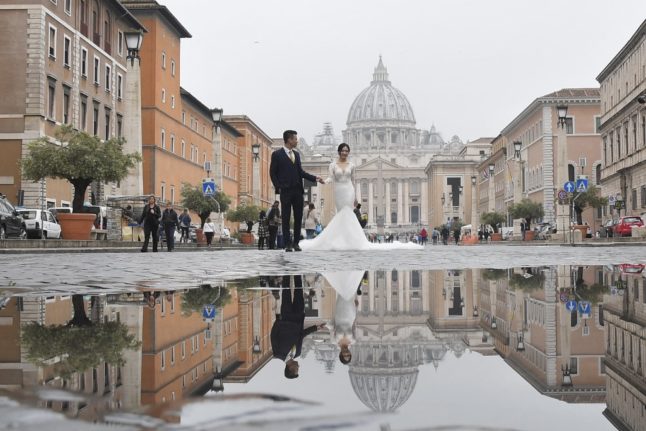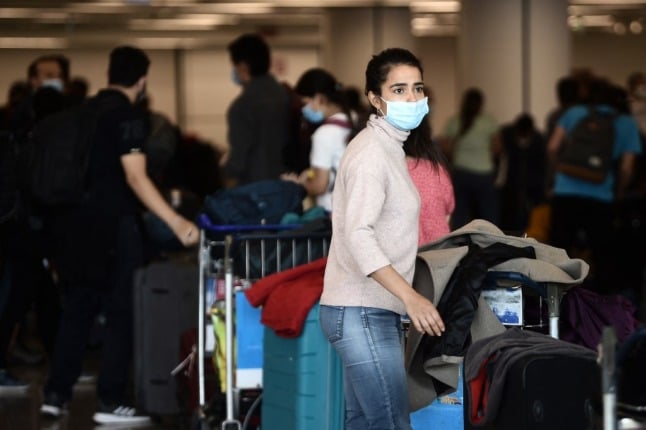Italy’s announcement that it would extend a five-day quarantine for travellers coming from the UK has had major repercussions on people’s plans this summer.
With just one day until it was due to expire, Italy’s Health Minister Roberto Speranza announced via Facebook on Thursday evening that he’d signed an ordinance to prolong the rule until August 30th.
EXPLAINED: How travel between the UK and Italy has changed
It means that people have had to cancel their holiday plans, postpone seeing loved ones yet again, or lose business, as any hopes of dropping the restriction in Italy’s peak tourist month were dashed.
As I read Speranza’s post, I finally had to admit defeat and accept that those closest to me won’t make my wedding, after pushing it back twice already.
We said that we couldn’t go through this again – we’ve planned and replanned a wedding three times and we’re so far beyond exhausted, we’ve lost all joy for the event.
It was only going to be an intimate gathering anyway, but to not even have your few best friends there to send you off into married life is heartbreaking.

After two years of not seeing them, I was desperate for that emotional support.
To reach this point, just four weeks from the wedding day, and fall at the final hurdle is too much of a blow to delay it again. For me, there’s no dilemma – just grief for the day we will now never have.
It seems the move has affected many others too, who told The Local they were left angry and upset.
Gemma Tromans from Birmingham told us of her despair at the news, as her wedding date is also set for the end of August. This, too, is her third date and this time, she was sure that her big day on Lake Garda would go ahead.
She described the situation as “a nightmare” and “never-ending”, as she is now looking at a potential fourth date to say ‘I do’.
“I feel very annoyed and deflated – the whole situation has just become so exhausting for me and my partner. The stress leading up to this and every other time has been awful for us both,” said Gemma.
READ ALSO: Ask an expert: ‘How can I still have my dream Italian wedding under Covid restrictions?’
She told us she originally had 45 people coming to the event, but each time they were forced to postpone due to restrictions they lost guests, and now have 30 people on the list.
The latest move has left Gemma nervous that the number will decrease again, and she admitted she was “dreading” telling her family and friends they’re looking at delaying it once more.
Not only does she and her partner have the headache of rescheduling, there are cost implications too.
Due to the venue requiring a minimum number of guests, as numbers dwindle, they have to increasingly fork out more to compensate.
She also pointed out that airlines are unlikely to offer refunds, as flights may not be cancelled – it’s on the the traveller to quarantine and travel is still allowed, it’s just much more inconvenient.
REVEALED: How strictly is Italy enforcing rules on Covid testing and quarantine for UK arrivals?
The terms and conditions will vary from airline to airline, but even though Ryanair allows two flight changes free of charge, Gemma pointed out that you lose the money you paid for baggage allowance each time.
Gemma and I aren’t alone in having our wedding day in Italy ruined for the umpteenth time.
Many other readers have also written to say they will now have to postpone theirs or even cancel altogether, opting to get wed in the UK after all.
Same here mate it’s our 3rd time. Original date 17th June 2020 and moved to following June and then august. Think we will just get married in the UK completely wasted all the money on those legal and CNI forms. So disappointing
— Ollie Walton (@ollywood88) July 30, 2021
Countless other holiday plans have been upended too.
READ ALSO: UK to allow fully vaccinated travellers from Europe to skip quarantine (but not tests)
Travel industry expert Paul Charles tweeted that the decision to extend quarantine is “Italy’s loss”, as many British holidaymakers opt for other destinations.
Very surprising to see #Italy extend its 5-day quarantine for #UK visitors to 30th August. In peak season for villa owners, it is turning away hundreds of thousands of #UK visitors who won’t want to self-isolate. Italy’s loss is #Portugal #Greece #Spain’s gain. @ThePCAgency
— Paul Charles (@PPaulCharles) July 30, 2021
While some travellers have already decided to book elsewhere, others told The Local their holiday plans are “ruined” following the news, and are worried about how they’ll get their money back now that they can’t make it to Italy.
Mark Taylor said his break in August was booked for six days, making it unfeasible now that five of those would have to be spent in isolation – and with children.
Yep, family holiday ruined. All double vaccinated. And as flights not actually cancelled doubt we’ll get our money back
— Mark Taylor (@markbrainchoke) July 30, 2021
Some haven’t had to make a call, as travel operators have taken the decision to cancel holidays to Italy.
Steve Morrow told us TUI cancelled his holiday to Sicily for the end of September, which they’d already postponed from last year due to restrictions.
He described the company’s decision as “hasty” and said he’s still waiting for a full refund from the first postponed holiday.
TUI announced that it was cancelling holidays, including flight-only and accommodation-only bookings, to Sardinia, Sicily and Calabria due to depart on or before October 31st. Other holidays to Italian lakes and mountains destinations have also been cancelled by the provider.
Many others expressed their dismay at the last-minute nature of the decision, with several people describing it as “shambolic”.
Due to fly out 4th for annual family visit. Cancelled last year because of covid & been waiting all week for an announcement that was make just hours before the expiry date & on Facebook! Too late to rebook without extortionate fees. Work commitments prevent rearranging anyway.
— ʟᴀᴋᴇʏ (@AvantiBlues) July 30, 2021
Sarah, who lives in the UK, tells us she’s been to Italy 30 times and that getting back here is the only thing that’s kept her going through lockdown.
She said: “It feels like the end of the world having that taken away.”
It’s not just British visitors affected. Emma Raymond is based in Bologna and hasn’t been back to the UK in two years. She said last night’s decision has meant she’s had to cancel her trip back to the UK, as she couldn’t afford the quarantine on returning to Italy.
I completely understand the need to be prudent etc, but the rules being confirmed last minute at the end of July was just too late- I think there could have been a cautious summer roadmap weeks ago (on both sides), us expats here have really suffered I think
— Emma Raymond (@emmray) July 30, 2021
Seema, who also lives in Italy, said she would miss out on a long-awaited visit from loved ones in the UK.
Devastating! I live in Italy and have not seen my family or friends for 18 months and they were suppose to be flying out to Italy next week to celebrate my 40th Birthday . Quarantine not possible as they were coming for a few days each throughout August, all double jabbed!
— Seema Scarci (@Mavanis) July 30, 2021
Others based in Italy said their businesses here have suffered, like this accommodation owner in Tuscany.
It’s a mess. Handling the cancellations of UK bookings the whole morning, of course won’t resell those rooms at such short notice.
— LiveFromTuscany (@livefromzurich) July 30, 2021
Some travellers are making the trip regardless.
People with property in Italy have told us that they’ll still travel as they need to make repairs and do maintenance work on their second home.
EXPLAINED: How should travellers from the UK quarantine in Italy?
Meanwhile others said they would wait for another opportunity – but not until after the summer.
Waiting for family to be able to come and visit first baby, born June. Maybe October?!
— Science Mrs A (@ScienceMrsA) July 30, 2021
If you’re looking to travel between Italy and the UK, you can find the updated rules for travel to both countries here.
The Local will continue to follow the travel restrictions closely. Please check our homepage or travel news section for the most recent reports on any changes to the rules.



 Please whitelist us to continue reading.
Please whitelist us to continue reading.
Absolutely gutted as we were due to go next month as we do every year. What are the chances of a U-turn?
Our annual trip to Positano cancelled for a second year in a row. This year was husband’s 50th birthday, on top of it. Had a special room booked, magnificent dinner…all dashed. This has simply got to end.
Same as most I guess, our headache has been postponement of wedding due in May last year and now August this. Wedding companies/caterers etc have been really good to postpone but kind of takes away the excitement. Such a tricky one for all. Needs to be some clarity but I fear with non EU status that makes it harder. We can but hope this situation changes soon.
Yet another consequence of Brexit, as you point out. Not one good thing has come out of it for those of us who are resident in Italy.
I full well understand that disappointment of cancelled and postponed travel, but the truth is that Covid does not follow rules and public health far outweighs convenience.